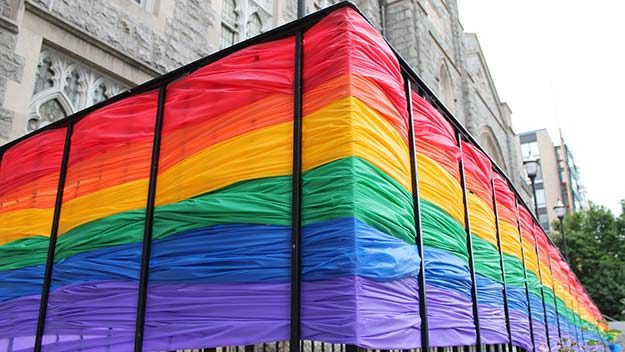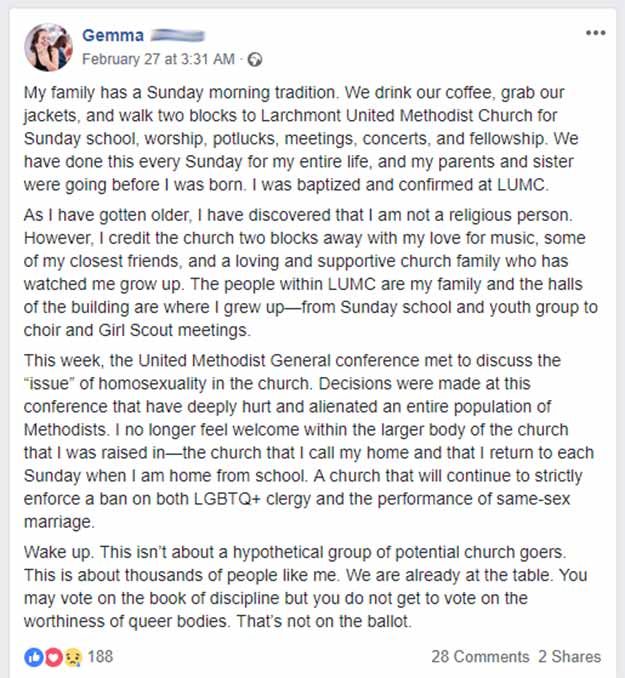The United Methodist Church is working to attract more young people, but will the decision to uphold traditional teachings banning LGBTQ+ clergy and same-sex marriage help or hinder their cause?

“Homosexuality is incompatible with the teachings of the church,” quotes the Book of Discipline, the guiding resource for the United Methodist Church, which has over 12 million members worldwide.
In a Special General Conference session held 23-26 February, an international body of United Methodist clergy, laity, bishops, elders, deacons and members met to discuss proposals concerning the presences of LGBTQ+ within the structure of the church.
Proposals came from the Commission on a Way Forward, a group of 32 members appointed by bishops at the 2018 General Conference to try to find ways for the denomination to navigate the deep differences in opinion surrounding homosexuality.
“I think there is definitely most of the United States that would say they would at least like for there to be space for all of us to be in the same denomination,” said L.C., a prospective United Methodist minister. Similar feelings are echoed by other Methodist congregations worldwide.
The church ultimately voted to uphold current teachings that restrict same-sex marriages and open members of the LGBTQ+ community from joining the clergy, casting doubt on the future of the United Methodist Church continuing in its current status.
Proud to say that this is MY dad #UMC #UnitedMethodistChurch #🏳️🌈 pic.twitter.com/qzHZ2daNXi
— Carrison Ford (@carrislagos) February 26, 2019
Special General Conference on the Commission on a Way Forward
According to the Book of Discipline, the United Methodist Church is open to everyone, regardless of their sexual orientation, identity, race or background. When it comes to marriage and membership of clergy, however, the church does not allow same-sex marriages or clergy who openly identify as a part of the LGBTQ+ community.
The Commission on a Way Forward put forth two plans for consideration at the February conference, one called the Traditional Plan, which would maintain current church teachings on human sexuality, and one called the One Church Plan.
The One Church Plan would allow for individual clergy and conferences to make their own decisions whether to perform same-sex weddings and ordain LGBTQ+ clergy, while still maintaining their ties to the larger church.
Over 800 delegates gathered in St. Louis, Missouri to vote on the two proposed plans, but an early defeat for the One Church Plan on the second day of the conference foreshadowed the eventual decision.
Delegates voted 461 to 359 to approve the Traditional Plan as the teachings of the church, at least until the next General Conference in 2020.
“The outcome of the general conference really indicated how divided our denomination has become and how polarised that our denomination has become,” said L.C.
Is there a way forward?
Many members of the church see the vote as reflecting only a small part of the general population of the church, and that it may have negative impacts as the church tries to attract more from the younger population.
Dear United Methodist Church, What If You’re Wrong? https://t.co/9bdTlXnxTC pic.twitter.com/5RKYRu1MsN
— Chris Kratzer (@chriskratzer) February 28, 2019
“I think that even more than division and polarisation there is a way of which the people most deeply impacted by the decision have not had their voices heard,” said L.C. “The LGBTQ community and, in particular, the people of colour within that community and the young people in that community not really represented and their voices were not heard.”
With over half its population over 60 years, many proponents of the One Church Plan see the choice to adopt the Traditional Plan as detrimental to efforts to bring more young people to the church.
However, some see the decision as a potential catalyst for more people getting involved in the discussion.
“You’ve inspired an awful lot of people who were not really engaged in this struggle before,” said Adam Hamilton, a pastor of a Methodist congregation, quoted in a release from the General Conference.
L.C. pointed to the petition that gathered over 15,000 signatures in 13 hours from Methodist members under the age of 35 saying they do not believe the Traditional Plan reflects their hope for the future of their church as evidence that the fight is not over.
“But I also know that many young people in order to in order to preserve themselves and in order to feel safe many young people will probably leave the United Methodist Church,” said L.C.

In order to change that, L.C. and other young Methodists need to find a way to have their voices heard, but that will mean that some of the current generation of Methodists will need to give up some of their power in decision-making positions.
“This is the church that we have called home for many generations,” said L.C. “It’s the church that we have found a calling in and a so there’s that element of this church being a home.”
Moving forward
https://twitter.com/rkhavard/status/1100534212740947968
“For young people who may be feeling heartbroken or may be feeling rejected by their churches and their denomination as a whole, I think the most important thing is to take your own emotional and spiritual health into consideration,” said L.C., “and if you are still wanting to be part of the United Methodist Church but there’s the Reconciling Ministries Network…
“On that website you can find churches that we consider reconciling and that means they are at least trying to do the work of being not only inclusive but affirming of LGBTQ people.”
https://twitter.com/kevinkwright/status/1100199046352908288
Churches in the British Isles
The issue of homosexuality and the church is a contentious issue among most major denominations. For every congregation or denomination that votes to approve same-sex marriage or for the ordination of LGBTQ+ clergy, there are an equal amount or more who decide to stick with laws as portrayed in the Bible.
Below is a breakdown of the six major denominations in the British Isles and their official stance on these two issues (disclaimer: individuals parishes and regions may practice different views)

(function (d) { var js, id = “genially-embed-js”, ref = d.getElementsByTagName(“script”)[0]; if (d.getElementById(id)) { return; } js = d.createElement(“script”); js.id = id; js.async = true; js.src = “https://view.genial.ly/static/embed/embed.js”; ref.parentNode.insertBefore(js, ref); }(document));
